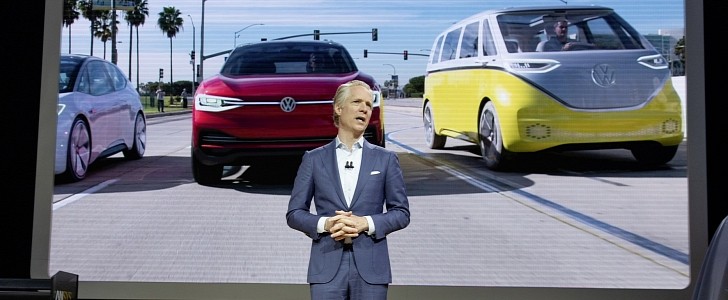Tesla is not alone in its protests about tax incentives exclusively for EVs made in unionized plants. After Toyota also said that the EV credit would discriminate against cars made in the U.S., the Volkswagen of America Group CEO expressed the same concerns.
Scott Keogh said that in an interview with “In the Driver's Seat,” a radio program hosted by Doron Levin on SiriusXM's Business Radio. The discussion will only be aired on November 2, but Automotive News got access to it and learned Keogh was also against the incentive.
The Volkswagen executive said that it was “fundamentally wrong” because all the EVs eligible for that union incentive will be made in the U.S., which seemed to be the point of the tax credit. That alone may lead to a WTO (World Trade Organization) dispute claiming the incentives are a protectionist measure. Keogh also stated that it puts “resources in the wrong place.”
Stephen Ciccone, a group vice president at Toyota Motor North America, sent Automotive News a statement on October 12 against the proposition. The reasons he presented for it to be denied are similar to those offered by Keogh.
According to the Toyota executive, it would be weird if Congress decided to give up to “$12,500 to people who can afford a $75,000 electric car” while it still debates if there will be enough money for “child care, family leave, health care, and other issues.”
Both Toyota and Volkswagen have factories in the U.S. that their workers decided not to unionize. In Volkswagen’s case, the decision was taken by a small margin of votes. Tesla claims to have also allowed its workers to decide about that freely. However, the NLRB (National Labor Relations Board) convicted the company for union-busting practices such as firing an employee campaigning for the Fremont plant’s unionization.
Michigan lawmakers proposed the incentive and it intends to make unionization a competitive advantage for automakers. It would also benefit GM, Ford, and Stellantis, which have considerable investments in that state.
The Volkswagen executive said that it was “fundamentally wrong” because all the EVs eligible for that union incentive will be made in the U.S., which seemed to be the point of the tax credit. That alone may lead to a WTO (World Trade Organization) dispute claiming the incentives are a protectionist measure. Keogh also stated that it puts “resources in the wrong place.”
Stephen Ciccone, a group vice president at Toyota Motor North America, sent Automotive News a statement on October 12 against the proposition. The reasons he presented for it to be denied are similar to those offered by Keogh.
According to the Toyota executive, it would be weird if Congress decided to give up to “$12,500 to people who can afford a $75,000 electric car” while it still debates if there will be enough money for “child care, family leave, health care, and other issues.”
Both Toyota and Volkswagen have factories in the U.S. that their workers decided not to unionize. In Volkswagen’s case, the decision was taken by a small margin of votes. Tesla claims to have also allowed its workers to decide about that freely. However, the NLRB (National Labor Relations Board) convicted the company for union-busting practices such as firing an employee campaigning for the Fremont plant’s unionization.
Michigan lawmakers proposed the incentive and it intends to make unionization a competitive advantage for automakers. It would also benefit GM, Ford, and Stellantis, which have considerable investments in that state.






